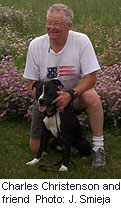
TUESDAY, March 30 (HealthDay News) — Some recovering heart patients are getting a new “leash” on life as they gain strength by walking dogs housed at a local shelter.
The innovative program, called Cardiac Friends, is a partnership between ProHealth Care (PHC) and Humane Animal Welfare Society (HAWS) of Waukesha County, in Wisconsin.
“It’s a great way to help the dogs and also help our patients too,” said Jennifer Ehrhardt, a clinical exercise physiologist at PHC’s Waukesha Memorial Hospital.
Motivating patients to get active and stay active can be challenging, she noted. But the year-old Cardiac Friends program gives animal aficionados recovering from open heart surgery, stent implantation or angioplasty a compelling reason to work out.
“We want to get people up and exercising as quickly as they can after they have some sort of heart procedure, if it’s OK’d by their doctor,” said Ehrhardt.
Exercise not only reduces the risk of another cardiac event but lowers cholesterol levels, decreases blood pressure and wards off depression — a funk many people fall into when recovering from heart surgery, she said.
Any kind of aerobic activity a patient does is beneficial to their health, Ehrhardt added. “If people have treadmills or bikes in their house we encourage them to use that,” she said. “But walking is a great way for people to get that activity in, and it doesn’t cost them anything.”
A handful of cardiac patients — so far, all men in their 70s — visit HAWS three times a week for an hour or more, taking dogs outside for some fresh air and fun.
Fenced-in areas on the property allow volunteers to play fetch with their canine charges, or they can take a stroll on a dirt walking path that zigzags through an open meadow adjacent to the shelter.
“We all enjoy the dogs and I think the dogs enjoy us,” said Charles Christenson, a retired corporate pilot who had open heart surgery three years ago.
Christenson said he has a treadmill at home but never uses it. Instead he prefers working out at the hospital’s gym and spending time at the shelter interacting with its canine residents.
“When you [first] take these little rascals out, they’re scared,” he said. “But if you talk nice to them, and treat them nice, pretty soon they’re your best buddies.”
Christenson and the other men in the program are some of shelter coordinator Sara Falk’s favorite volunteers because they spend so much time with the dogs.
“The Cardiac Friends have been a huge bonus to [our dog-walking] program in that most of them have been so consistent and they are taking longer walks than a lot of the other walkers because they have fitness in mind,” said Falk.
The patients aren’t the only ones benefiting. Getting dogs out of their kennels daily helps keep them physically and mentally sound while waiting for new homes, she said.
Interest in Cardiac Friends is beginning to create a buzz. Susan Kidder, an animal rescue advocate and founder of the program, has received inquiries from shelters in Arizona and California. And this fall, PHC’s Ehrhardt will give a presentation about the program at a national health care conference in hopes that other hospitals will start similar efforts.
“It’s a great fit for people who can’t have a pet because of their living situation,” explained Kidder, adding that the program is about much more than just helping cardiac patients stay active. “It’s about helping. It’s about being needed. It’s about making a difference.”
More information
Find out more about cardiac rehabilitation at the American Heart Association.

